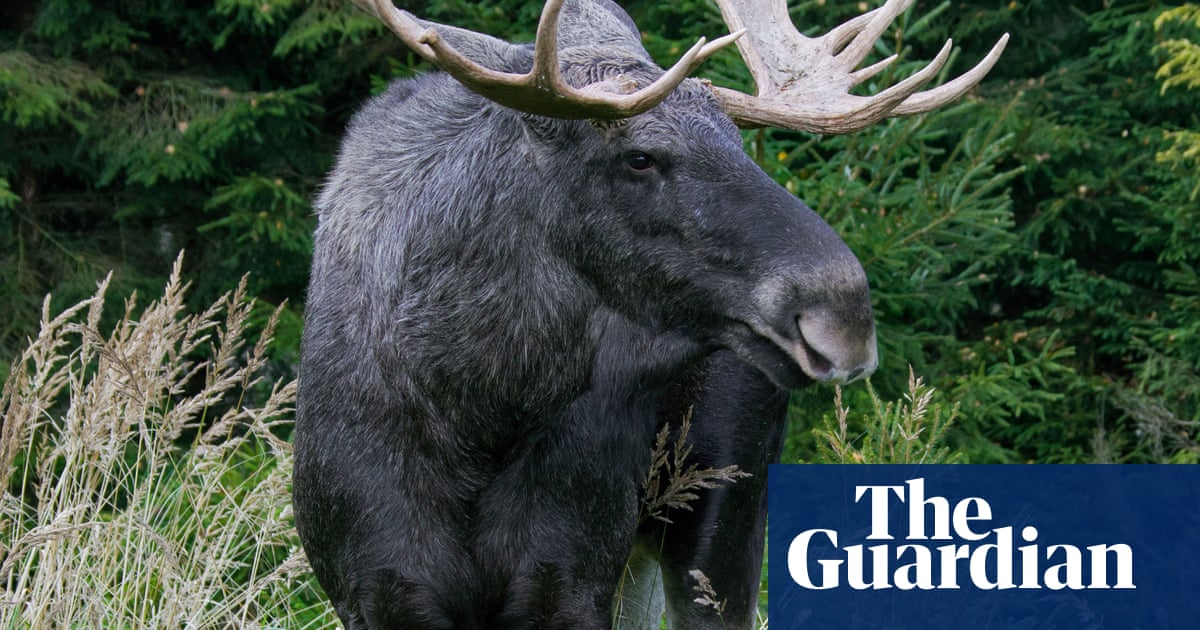An elk in the taiga in Värmland, Sweden. The species thrives in wetlands, where its grazing helps promote the natural regeneration of woodland. Photograph: Arterra Picture Library/AlamyView image in fullscreenAn elk in the taiga in Värmland, Sweden. The species thrives in wetlands, where its grazing helps promote the natural regeneration of woodland. Photograph: Arterra Picture Library/AlamyWildlifeElk could return to UK after 3,000 years in rewilding projectFirst stage of initiative will introduce ‘keystone’ species to beaver enclosures in Derbyshire and NottinghamshireHelena Horton Environment reporterWed 7 May 2025 17.51 BSTLast modified on Wed 7 May 2025 18.06 BSTShareElk could return to the UK after 3,000 years under plans by the Wildlife Trusts to reintroduce the “keystone” species into Britain’s landscapes.The Derbyshire Wildlife Trust wants to introduce elk into two existing beaver enclosures in Derbyshire and Nottinghamshire, with the hope of demonstrating that the large semiaquatic deer should be released to roam free in the wild.Joanne Carnell, from Derbyshire Wildlife Trust, said they hoped to demonstrate that the “crucial ecosystem engineer can thrive in floodplain landscapes, shaping diverse habitats that benefit communities and support biodiversity recovery. It may also serve as a catalyst for engaging people in the long-term benefits of returning elk to the wild.”Nature nurture: the Devon estate where rewilding and mental health go hand in handRead moreThe same process was followed with beavers in England, which were first released into enclosures in wildlife areas around the country, before being legally released into the wild this year for the first time.The charity Rewilding Britain is awarding up to £15,000 to multiple rewilding initiatives, including the elk project and some that aim to restore bison and beavers to the landscape.Rebecca Wrigley, the chief executive of Rewilding Britain, said: “Keystone species like elk, bison and beaver play a vital role in bringing nature back to life. They help repair ecosystems and shape wild places in ways that benefit wildlife, people and the climate.“Successfully reintroducing missing species like these is absolutely crucial. It’s a complex process involving multiple stages of research and development, feasibility studies, impact assessments and community consultations. By taking the time and effort to get it right, we can create a more hopeful future for everyone.”European elk are closely related to the North American moose and can weigh up to 700kg (110 stone). They thrive in wetlands, where their grazing helps promote the natural regeneration of woodland, while their trampling helps maintain open clearings. At present, the UK has no wetland habitats containing both beaver and elk.skip past newsletter promotionSign up to Down to EarthFree weekly newsletterThe planet's most important stories. Get all the week's environment news - the good, the bad and the essentialEnter your email address Sign upPrivacy Notice: Newsletters may contain info about charities, online ads, and content funded by outside parties. For more information see our Privacy Policy. We use Google reCaptcha to protect our website and the Google Privacy Policy and Terms of Service apply.after newsletter promotionElk became extinct in the UK about 3,000 years ago as a result of over-hunting and habitat loss, and were nearly wiped out across Europe, too. But they are slowly making a return, with established populations in Scandinavia.Rachel Bennett, the deputy director of wilder landscapes at Derbyshire Wildlife Trust, said: “This exciting project could demonstrate how this crucial ecosystem engineer can thrive in floodplain landscapes, shaping diverse habitats that benefit communities and support biodiversity recovery. It may also serve as a catalyst for engaging people in the long-term benefits of returning elk to the wild.”Explore more on these topicsWildlifeMammalsRewildingNottinghamshireDerbyshireAnimalsnewsShareReuse this content










